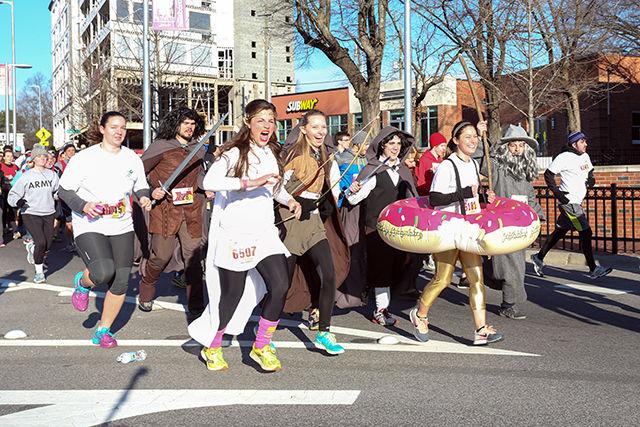All day long, children are marketed to buy junk foods — it’s on TV, inside vending machines in schools and the sponsor of afterschool sports. A new inadvertent advertisement for junk food has sprouted close to home according to the Center for Science in the Public Interest: the recently renamed Krispy Kreme Challenge Children’s Specialty Clinic.
Since 2006, the Krispy Kreme Challenge, a 5-mile race, has been a supporter of the North Carolina Children’s Hospital and the sick and injured children it caters to. The hospital’s goal is to provide the best care possible to patients from all over North Carolina, regardless of the families’ ability to pay, according to the Krispy Kreme Challenge website.
The money donated by the NC State Park Scholars who facilitate the Krispy Kreme Challenge not only funds the medical equipment and programs for treatment and care, but also the care for the emotional well-being of the children by providing play equipment and on-site activities for patients. NC Children’s Hospital also has a fully accredited UNC Hospital School to ensure its patients do not experience an educational disadvantage in addition to being ill.
Despite the good the money raised by the Krispy Kreme Challenge does, the use of the brand inadvertently markets Krispy Kreme’s donuts to children. Jessica Almy, the senior nutrition policy counsel for the Center for Science in the Public Interest, said she believes that kids are advertised to buy junk food from companies too much and encourages companies to do better in advertising. She says this can be done by only advertising the healthiest food on kids’ televisions.
“We are living in a culture where there’s so much marketing — kids will eat doughnuts anyway,” Almy said. “Changing the advertising for food to children is one piece of a bigger vision for kids’ health. We want more balance, to have health promoted, and this hospital name change is one more example of going in the wrong direction.”
Park Scholar Rebekah Millsaps, the race director for the Krispy Kreme Challenge and a senior studying business administration, stated that things are not finalized yet and could not give an official comment.
“We are still going through stuff about the naming with the Children’s Hospital, and we are not at liberty to discuss anything about it at this point,” Millsaps said.
Almy and the Center for Science in the Public Interest are disappointed in the rename, believing that it sends the wrong message to both kids and parents.
“It’s great that the students raised the money, and we’d be fine with any name that doesn’t have Krispy Kreme in it,” Almy said. “We’d be happy to have it named after the Park Scholars themselves.”
Almy said she believes it is important to recognize the gift made by the Park Scholars in its donation of $2 million. The concern of the Center is that the name change will not make people think about the run, but rather the corporation the run is named after.
“The main problem is it is free advertising for Krispy Kreme, and naming the hospital after the Krispy Kreme Challenge is inadvertently advertising for a junk food brand,” Almy said.
The petition to prevent the renaming of the Children’s Specialty Clinic was not successful before the renaming occurred, but the Center is not giving up. Almy said that it is planning to continue pushing the petition and would welcome the opportunity to meet with UNC hospitals to discuss good opportunities to affirm kids’ health.
“Our supporters are surprised Krispy Kreme is not paying for the name change,” Almy said. “It’s fantastic that students are taking an interest in the Children’s Health Clinic, but calling the clinic the Krispy Kreme Challenge Clinic undermines doctors’ credibility and sends conflicting messages.”








